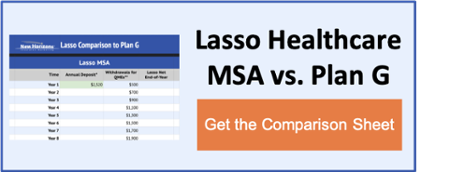As an independent insurance agent in the Medicare space, you’re bound to see a little bit of everything. However, something you’re probably seeing more and more is clients that are choosing to work past the age of 65.
Medicare-eligible clients are going to turn to you for advice, so it's important to be prepared with a thought-out recommendation.
Here's a quick guide to making sure you're helping Medicare clients that have chosen to delay retirement.
Why Are a Growing Number of Seniors Working Past 65?
As of 2019, about 1 in 5 Americans over age 65 are either already working or are actively looking for work (Census Bureau and Bureau of Labor Statistics). That's the highest number of working seniors in 57 years.
There are a couple reasons for this, one of which is obvious: finances.
Lack of retirement savings
New data from Northwestern Mutual's 2019 Planning & Progress Study found that around 15% of Americans have absolutely nothing saved for retirement.
And a huge portion of those that have saved haven't placed a high enough priority on it. According to Vanguard, the median 401(k) account balance for someone aged 65+ is only $58,035.
In addition, most workplaces have done away with traditional pensions, and the individual is now largely responsibly towards contributing to their own retirement plan.
While there are individuals who simply haven't saved enough, there's another group that probably has, but they're worried they'll run out of money. This worry might be a bit overblown according sources like Financial Samurai, which explain that on average, retirement can cost about 30% less than projected.
Regardless, many boomers choose to continue working past the age of 65 as they don't feel financially ready to retire.
However, money may not be the largest reason that seniors choose to delay retirement.
Desire to keep on keepin' on
Some of us just aren't ready to retire, despite how much we have saved for the life event. According to Lincoln Plews, a research analyst at United Income (interviewed by Business Insider), the largest increase in people who are choosing to work past age 65 are educated and well-off.
This rising group of adults has a college education and a median net worth of just under $750,000.
The reason this group chooses to continue working is largely due to... well, feeling like it!
Older Americans are healthier than they've ever been, and many over age 65 report that they're simply not ready to give up their work. Work brings meaning and purpose to the lives of many, and giving that up marks a gloomy ending that they're not quite ready for.
If you still have your health, and you feel more capable than ever, why give up a career you've worked decades to build up – especially if you feel it's your passion?
Two Medicare Options for Delayed Retirees
No matter the reason for working past age 65, the trend is clear: more adults over age 65 are choosing to stay in the workforce.
These adults have two options as they approach age 65:
- Drop their employer group plan and enroll in Medicare
- Keep their employer group plan and delay enrolling in Medicare Part B
(Note: They can also delay enrolling in Medicare Part A, but almost no one does since it's typically premium-free, so it doesn't hurt to have it.)
The best way to approach the decision is to lay out their current group coverage. I'm serious about this – grab a pen and paper and write down their benefits. What are they responsible for, and what does their employer pay for?
Have your client write down or supply you with the following:
- What do they pay in premium per month?
- What are their copays and coinsurance?
- What is their deductible?
- What is their out of pocket maximum?
- Do they get an employer stipend or reimbursement?
When you see these numbers written down, you'll likely be able to tell pretty quickly if Medicare beats their current group plan. However, it truly is on a case-by-case basis.
For example, if the client isn't paying any of their premium, staying on the group plan may be in their best interest. While the deductible and out of pocket max might be worse than Medicare's, the fact that the client has no premium right now can offset that.
On the other hand, if they're shelling out $500+ per month in healthcare premiums, moving over to Medicare is basically a given.
Another factor besides the set-in-stone benefits is the health of your client:
- What's their medical history like?
- Are they reaching their deductible or out of pocket maximum every year?
- Are they only seeing the doctor once a year for a checkup?
Looking at All Medicare Product Solutions
Comparing apples to apples is getting more difficult as more Medicare health insurance options enter the market.
Now, you have three main product solutions you can show to your 65+ client:
- Medicare + Medicare Supplement + Part D drug plan
- Medicare Advantage (typically MAPD, which includes prescription drug coverage)
- Medicare MSA + Part D drug plan
What's available in your client's county and state will determine whether or not Medicare Advantage or the MSA are real contenders, but in any case, there are lots of options to compare against your client's employer group plan.
Also, be sure to ask your client about their personal preferences regarding how they feel about their health, what kind of financial risk they're comfortable with, and whether or not they're totally turned off by a deductible. That might point in one direction or another as far as your recommendation goes.
Learn More: What Is the New Lasso Medical Savings Account (MSA)?
Considering Networks
While the plan benefits and costs will likely drive the decision making, networks are another huge factor to consider.
Most employer group plans have networks. If the network has been a consistent issue for your client, they may want to switch to Medicare regardless of how great their employee benefits are.
They could be a great candidate for a Medicare Supplement or Medicare MSA, as both are accepted everywhere that Medicare is (over 90% of all doctors).
Orchestrating the Switch – Medicare Enrollment Rules After Age 65
Now for the most interesting reading you've ever experienced – Medicare enrollment rules! (Can you sense the sarcasm?!) While this isn't the most exciting stuff, it is important to have a good understanding of the timeframes involved with switching over to Medicare past age 65.
If your client is switching over to Medicare past the age of 65, and they have employer group coverage, they qualify for a Special Enrollment Period (SEP). As long as they are covered under a group health plan based on their current employment, they have an SEP to sign up for Medicare Part A or B anytime.
While there are a lot of moving parts, these are the important SEP rules for Medicare enrollment after age 65.
1. Signing up for Medicare Part A and/or Part B.
Your client has an 8-month SEP that starts the month their employment ends OR the month after their group health insurance ends.
2. Signing up for Medicare Part D.
If the group plan has credible drug coverage, your client should sign up for Part D the month before they'll need to replace it. This is a Special Enrollment Period (SEP) for those who are moving from a group plan to Original Medicare.
3. Choosing a Medicare Supplement.
Choosing a Medicare Supplement needs to happen 6 months after your client enrolls in Medicare Part B. During this time, they can select any supplemental plan with no health questions. This would be their Medigap open enrollment period.
And here is a common Guaranteed Issue (GI) scenario we often see with seniors working past 65 as well: if they already have Medicare and their group is their secondary, but their group plan is ending, they have a GI right.
Your client has 60 days after they lose your group coverage to sign up for a supplement. They can choose from Plans A, B, C, F, K, and L. If they can pass health questions, they can go through underwriting and choose any plan they want.
The complex part of this is Plans C and F phasing out for newly eligible Medicare enrollees in 2020.
New GI Rules After January 1, 2020
You're considered "newly eligible" if you've attained age 65 or first became eligible for Medicare due to age, disability, or ESRD on or after January 1, 2020.
Plans D and G will become two of the guaranteed issue plans for “newly eligible” Medicare Beneficiaries on or after January 1, 2020 (Plans C, F and High Deductible F of the current Guaranteed Issue plans will no longer be available for “newly eligible” Medicare Beneficiaries).
If you have a client that was newly eligible for Medicare before January 1, 2020, they can still choose from Plans C or F, even after 2020.
Helping Seniors Who Choose to Work Past Age 65
The way employers handle healthcare for retirees is rapidly changing, and these individuals will likely come to you for a recommendation.
We hope this article helps you understand how to decide whether to delay Medicare enrollment or take advantage of some of the wonderful options in today's Medicare market.
If you have any questions or scenarios you need to run past us, please don't hesitate to leave a comment (we reply to every single one), start a chat (available during regular business hours), or give us a call at 888-780-7676.




![The Simple Question That Drove $9M+ in Annuity Sales [Case Study]](https://blog.newhorizonsmktg.com/hs-fs/hubfs/NH-The-Simple-Question-That-Drove-9M-in-Annuity-Sales-Case%20Study%20(1).webp?width=220&height=119&name=NH-The-Simple-Question-That-Drove-9M-in-Annuity-Sales-Case%20Study%20(1).webp)


